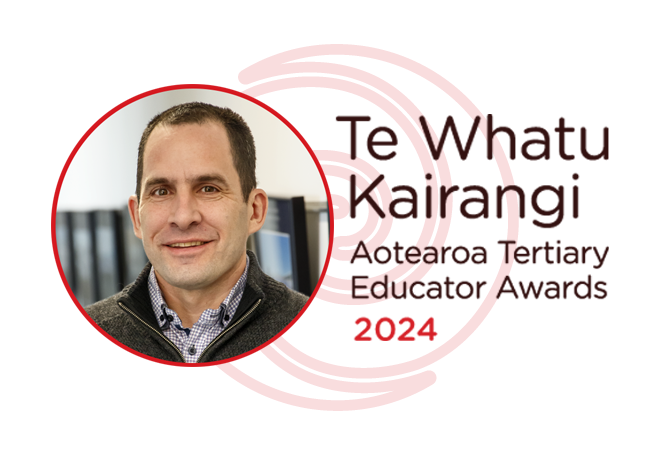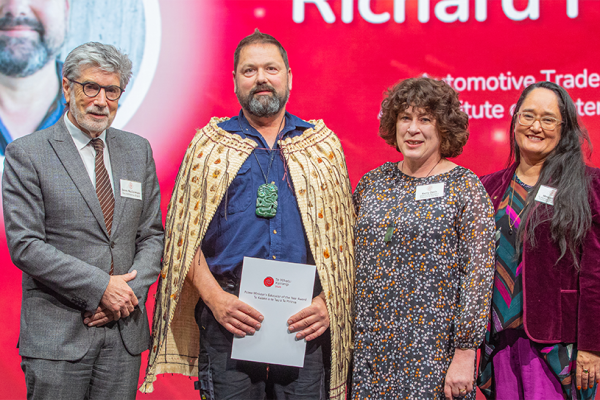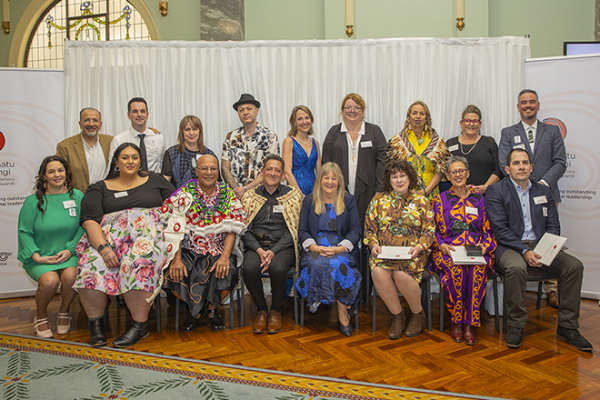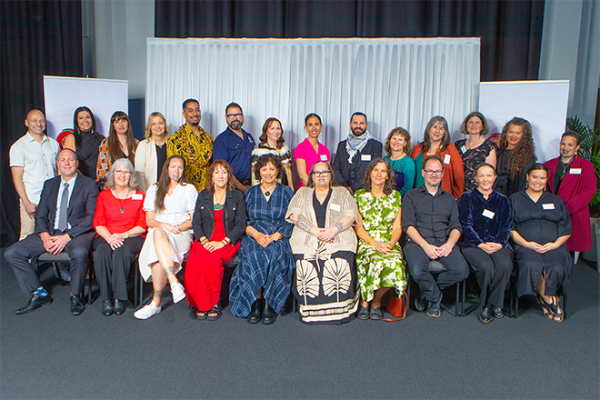John Murrie
A high-flyer in aviation training
Category winner: Innovation in learning, teaching, and curriculum
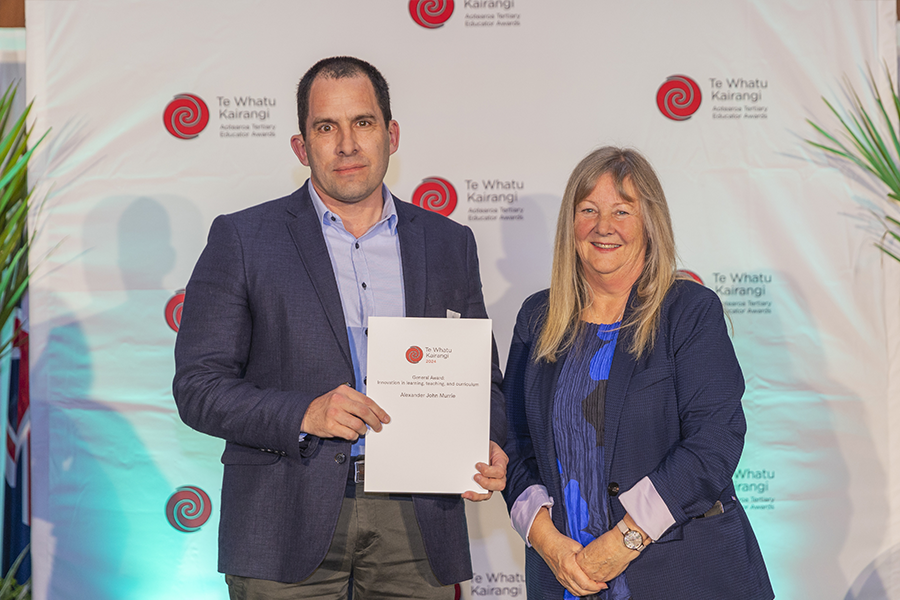
Lecturer, School of Aviation, Massey University
“Aviation students share a passion for flying and a common desire to acquire the practical and theoretical knowledge they need to begin or further careers in a demanding and constantly changing industry.”
The Massey University School of Aviation, whose student body consists of high-school leavers, mature students, and aviation industry professionals, teaches both the next generation of airline pilots and aviation industry professionals through its Pilot and Aviation Management programmes. It provides the only integrated degree and professional flight training programme in the country and is the only flight training provider whose qualifications are granted the equivalence of external Civil Aviation licences.
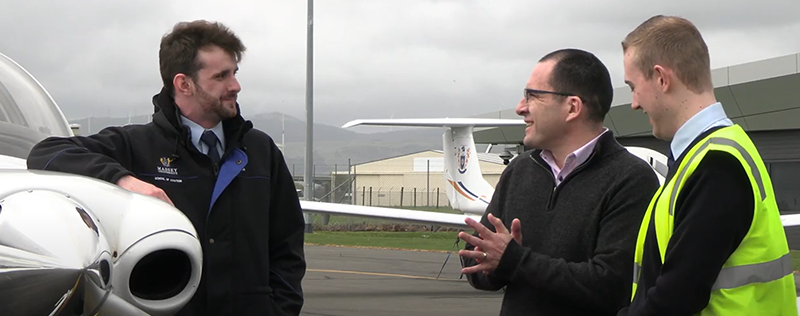
John has been teaching at the Aviation School since 2006 and at Massey University since 2003. He has delivered over a dozen courses across multiple programmes and disciplines, including Human Resource Management, Employment Relations, Airline Management and Meteorology. He teaches core courses within two undergraduate aviation programmes - the Bachelor of Aviation Management, focused on future industry professionals, and the Bachelor of Aviation, which produces the next generation of airline pilots. His teaching approach reflects the importance of student engagement and feedback and he continually adapts his teaching practice in response to student and industry needs, exemplifying a teaching style that emphasises engagement and student-centred learning.
The School of Aviation’s operating environment is challenging, characterised by capped enrolments, strict external accreditation requirements, and the complex demands of the aviation industry. This requires constant revision of course and programme content and teaching that emphasises adaptability, problem solving and an effective balance between practical and theoretical knowledge. Students undertake both internal (on-campus) and distance (off-campus) study, with internal students typically entering the school’s programmes direct from high school and distance cohorts consisting almost entirely of older aviation industry professionals. This mix presents a significant challenge to John’s teaching, requiring courses to balance the divergent needs, experiences and learning preferences of each group while ensuring their learning meets current and future industry needs.

John teaches three courses for the School, two in airline management, one for first-year and one for second-year students, each taught once a year to approximately 50 internal and 50 distance students per course, and a first-year course in aviation meteorology to 25-30 internal pilot students twice a year. As all three courses are mandatory for students enrolled in their respective programmes, they act as unofficial programme gate keepers, with curriculums that not only have to link students to, and prepare them for, future study, but set academic standards and expectations for those programmes. Learning for pilot students is complicated by a workload that is significantly higher than that for other tertiary students. Aviation students complete a four-year degree within three years in combination with extensive practical flight training and face higher academic standards aligned with the professional standards, curricula and assessment practices set and audited by the Civil Aviation Authority. These include, for example, summative assessments with a 70% minimum pass mark rather than the 50% required for standard tertiary courses. Also, students need to apply theoretical knowledge gained in the classroom simultaneously with the demanding operational environment encountered when flying. As a former commercial pilot, John knows first-hand meteorology’s importance to pilots and the challenge of linking theory to flight operations. He also understands the difficulties student pilots face in taking a traditionally science intensive subject and reframing it in a practical context.
The driving force behind John’s teaching practice and professional development is constant student and course evaluations and peer review. He evaluates his courses every semester and has found that aviation students, while a diverse group, want similar things - problem based learning, industry relevant courses, clear expectations, regular communication, and engaging and supportive teaching. Pilot students must also contend with the complexity of the Civil Aviation’s meteorology curriculum that contains hundreds of individual learning items with which they must be competent. In Meteorology, John has developed a ‘bookending’ approach that attempts to give students more control over their own learning. Lessons alternate between traditional lectures and small group discussions to engage students. It involves working collaboratively with students, using group and individual activities to explore and discuss topics, allowing students to develop their own solutions to relevant problems and to draw from operational practice or course lesson plans to learn from each other.
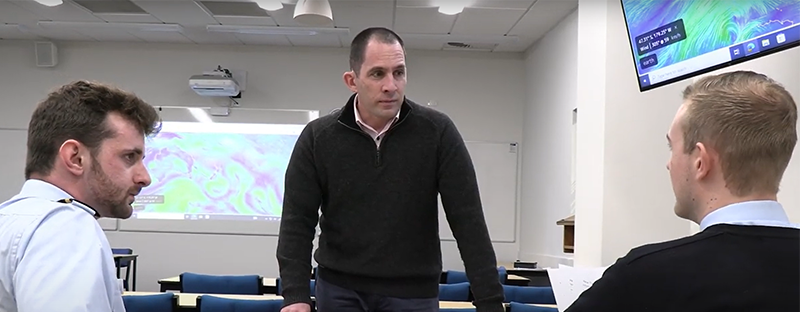
Despite receiving consistently high positive student feedback, John was concerned by a trend towards low completion rates for distance students in Aviation Management and wanted to improve these. He noted that low completion rates were related to a decline in student engagement and satisfaction, notably with assessment. He worked with Massey University’s Teaching and Learning Enhancement Service to adopt new approaches, including duplicating the student/teacher-developed lesson plan process he had successfully used in Meteorology. Another tool has been to regularly foreground aviation in the news, with posts highlighting and discussing industry events. Other activities include self-paced learning packages, word-clouds, discussion forums, Padlets, and formative assessment tasks. As a result of these changes the proportion of students who withdrew or failed to complete the course fell to historically low levels. In recognition of the positive impact these approaches had shown on student learning, John completed an AdvanceHE Teaching Fellowship in 2023 and received the 2023 Massey Business School and Massey University Vice Chancellor’s Awards for Teaching Excellence.
John’s non-teaching responsibilities include membership on several strategic, policy, and decision-making committees, such as the Business School’s College Board (since 2018), the Assurance of Learning Committee (2015-2019), the Academic Programmes Committee (2017-2020), and the Teaching and Learning Committee (since 2018). In May 2024 he was also elected to the Universities Teaching and Learning committee which has similar responsibilities for the University as a whole.
“Twenty years after beginning my teaching journey I still love what I do and have earned a reputation for being an engaging and caring teacher who does his best for his students and who contributes positively to teaching within my School and University.”
